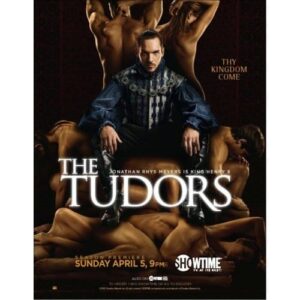 It’s interesting the reaction you get from people when you mention the hit TV series “The Tudors”. In fact, in my experience there are three main reactions:-
It’s interesting the reaction you get from people when you mention the hit TV series “The Tudors”. In fact, in my experience there are three main reactions:-
- A lighting up of the eyes and excitement – These are the people who rave about how wonderful Jonathan Rhys Meyers is, what a great Anne Boleyn Natalie Dormer was, how sexy Henry Cavill is… etc. etc. and how wonderful the program is at portraying the Tudor period warts and all.
- Shock and horror – People who believe that “The Tudors” is pretty much a swear word – David Starkey publicly lambasted the series for its “ignorance of facts” and said: “I’ve got no problem with getting history wrong for a purpose – Shakespeare often got things wrong for a reason. But it’s the randomised, arrogance of ignorance of The Tudors. Shame on the BBC for producing it.”
He’s not the only one who feels this way. In many circles, if you mention that you watch “The Tudors” then that’s pretty much saying that you are not serious about history and you may even get thrown off forums and discussion boards – a bit like mentioning “Philippa Gregory” – oops, I mentioned her!! - A balanced appreciation – There are those (like me!) who love “The Tudors” for what it is – entertainment! I love its richness and vibrancy, the way it brings the characters to life, the way it portrays life at the Tudor Court and the way it makes it so real. Yes, it is littered with inaccuracies, but as Anne Boleyn Files visitor Gemma pointed out, it also has many accuracies. Gemma pointed out about the episode where Henry falls in the river and gets his head stuck in the mud – an event that really happened but that not many people knew about previously.
The reason I’m blogging about “The Tudors” today is partly because many people commented on how I mentioned it in yesterday’s post, but also because Tudor historian Dr Tracy Borman has written an article for “The Radio Times” (copied in the BBC History Magazine) defending the series. Wow, an historian saying she likes it!!
In her article, “The Truth Behind “The Tudors””, Borman writes:
“Having been determined to loathe the hugely popular BBC series, with its unfeasibly beautiful actors, dodgy costumes and improbable storylines, I found myself becoming strangely addicted…I grew to appreciate The Tudors for its merits as an historical drama. Yes, the scriptwriters may have taken liberties with the facts, but they have also succeeded in recreating the drama and atmosphere of Henry VIII’s court, with its intrigues, scandals and betrayals. And if Jonathan Rhys-Meyers bears little resemblance to the red-headed, bloated image of Henry that we know so well from contemporary portraits, then he does at least evoke the dangerously seductive charisma and magisterial arrogance that kept a court in thrall for almost forty years.”
Borman also makes the point that I have often made about how the series has had a positive effect in that it is stimulating people’s interest in the Tudor period. She writes of how Hampton Court Palace has seen a surge in visitor numbers and how the show even has its own wiki site. People are crying out for information on the era and the characters and, as owner of a Tudor history website, I can testify to this! I even have a friend who rings me after she’s watched “The Tudors” (she calls me her Historical Oracle!) to ask if events really did happen.
Borman goes on to say:
“In my view, this is all to the good. Television dramas, films and novels offer a way in to history and can inspire an abiding passion for the subject. Provided that they encourage people to find out what ‘really’ happened, rather than being treated as reliable historical sources in their own right, then they can and should be respected as a force to be reckoned with in the world of history.”
I wholeheartedly agree with her. I’m sure that if we looked at the sales figures for Tudor history books and the number of Google searches done on “Tudor”, “Henry VIII” etc., we would see a significant rise as people want to know what really happened. Also, is it any coincidence that so many Tudor history books are being published at the moment?
Another criticism of “The Tudors” is that it’s a bit like a soap opera, but then what else would you call Henry VIII’s life? I’m showing my age now but Henry is a lot more interesting than JR Ewing!
So, is “The Tudors really so bad?
I can’t criticise “The Tudors”, I think I would be two-faced if I did, because there are some of you out there who have set out on your mission to find out about Anne Boleyn because “The Tudors” piqued your interest and you found this site! If “The Tudors” helps to get people interested in Anne, if it helps me to spread the message about her and share the truth then long live “The Tudors”!
You can read Dr Tracy Borman’s article and her examination of Season 3 Episode 1, and the historical facts behind it, on the BBC History Magazine website. Her new book “Elizabeth’s Women: The Hidden Story of the Virgin Queen” is due to be published on the 24th September.